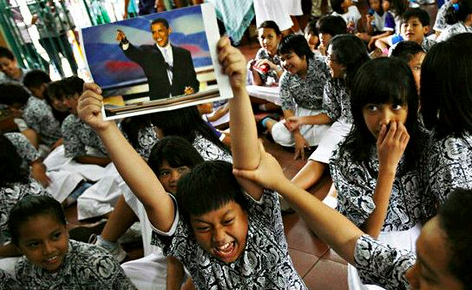A BBC survey of around 20 million people in 21 countries found high support for Obama during the run-up. As soon as President Obama’s reelection was formally announced, pictures of people around the world celebrating Obama’s victory flooded the Internet. A wave of congratulatory messages from world political leaders immediately ensued. But the diplomatic greetings aside, how does President Obama’s reelection to a second term translate to the world? Was Obama “the world’s clear choice” as Associated Press suggests?
Most congratulatory messages stressed hopes for closer economic and foreign policy cooperation. The general consensus in optimism lies in continuity: as leaders have known Obama for four years, it is easier to work with a more familiar team than to go through a new start.
“It’s always easier to establish a closer work relationship with a US president when he’s starting his second mandate”. (Jean-Claude Juncker, President of Euro Group and Prime Minister of Luxembourg)
Hopes for cooperation are also grounded in the expectation that the Obama administration will invest more in foreign policy, as the President doesn’t have to worry about reelection during the second term. Those eager to work with the US appeal to “shared” interests.
“The United States is a key strategic partner of the European Union and we look forward to continuing the close cooperation established with President Obama over these last four years, to further strengthening our bilateral ties and to jointly addressing global challenges, including in the fields of security and economy.” (José Manual Barroso, President of the European Commission)
“One of the first things I want to talk to Barack about is how we must do more to try and solve this crisis [in Syria] (David Cameron, Prime Minister of Britain)
Mr Mursi hopes for a “strengthening of the friendship between the two countries to serve their common interests, namely justice, freedom and peace,” a spokesman said. (Mohammed Mursi, President of Egypt)
For the liberals across the world, Obama’s reelection is a victory for the Keynesian ‘economic stimulus’ over the neoliberal ‘budgetary austerity.’
His victory will “once again reinforce our partnership to facilitate the return of economic growth in our countries, to fight unemployment, and to find solutions to crises that threaten us, notably in the Middle East”. (French President Francois Hollande)
The French “Hollandaise sauce” definitely has a taste of Keynesianism, but the EU, spearheaded by Germany, is running towards less spending. German Chancellor Angela Merkel, too, expressed her felicitations, but she appreciates the “conversations” she has had with the US. Perhaps there was not so much “common interest” to discuss in her message. But even this lukewarm statement does not fully disclose her firm stance that people and governments should not “live beyond their means.”
“I have deeply appreciated our many meetings and conversations about all the issues involved in developing the German-American and the transatlantic relationship, not least in overcoming the global financial and economic crisis.” (Angela Merkel, Chancellor of Germany)
Obama enjoys massive support in Indonesia—the president spent a few years in its capital Jakarta during his youth—and in France, the country most strongly pro-Obama in the BBC survey. His victory is probably also a relief for those in China who worried that Romney’s pledge to brand China as a currency manipulator if elected would hurt bilateral trade relations.
But although world leaders have welcomed reelection, they are not necessarily energetic. Those in Europe, for instance, are aware that Obama will be more “Asian-friendly” in his foreign policy. Europe was not mentioned in the TV debates between Obama and Romney. The expectation is that Obama will not be more present in Europe than he was during his first term.
Not everyone was pleased. The welcome in Muslim-majority countries was more cautious. In Pakistan, for instance, Romney was viewed as too Pro-Israeli and anti-Muslim. But the high-spirited hopes of 2009, of change that the new African-American US President would bring to the West-East discourse, seem to have faded. Part of the lukewarm feelings stem from the Obama administration’s ambiguous attitude towards the Pakistani government during US drone strikes. It asked Pakistan to facilitate negotiations with the Taliban, while launching operations on Pakistan territory without complete Pakistani approval.
Obama’s first term in office had been “very tough on Pakistan – an increase in drone attacks and a surge in Afghanistan and increased militancy in Pakistan as a result.” “Now Obama is no longer under the pressure to be re-elected we hope that he will give peace a chance” (Imran Khan, Leader of Opposition Party in Israel)
Other leaders stated they plan to preserve the “national” interest rather than the “common.”
“I will continue to work with President Obama to preserve thestrategic interests of Israel’s citizens.” (Benjamin Netanyahu, Prime Minister of Israel, who has had a strained relationship with Obama over Iran and the Israeli-Palestinian conflict)
“Under the new American administration we will see an increasing of pressures [on Iran], and maybe confrontation [with Iran], but Iraq will work to ensure its national interests ….” (Hoshiar Zibari, Foreign Minister of Iraq)
Venezuela’s President Hugo Chavez didn’t congratulate immediately as did other presidents, according to AP, but the state-run news agency did have something bitter to say.
Obama returns to power “with various promises unfulfilled.”
The Venezuelan government was probably referring to the Obama’s vow to close the prison in Guantanamo Bay, Cuba.
——
It is ironic that formal words of felicitation inadvertently expose the strained foreign relations these words were carefully chosen to conceal.
